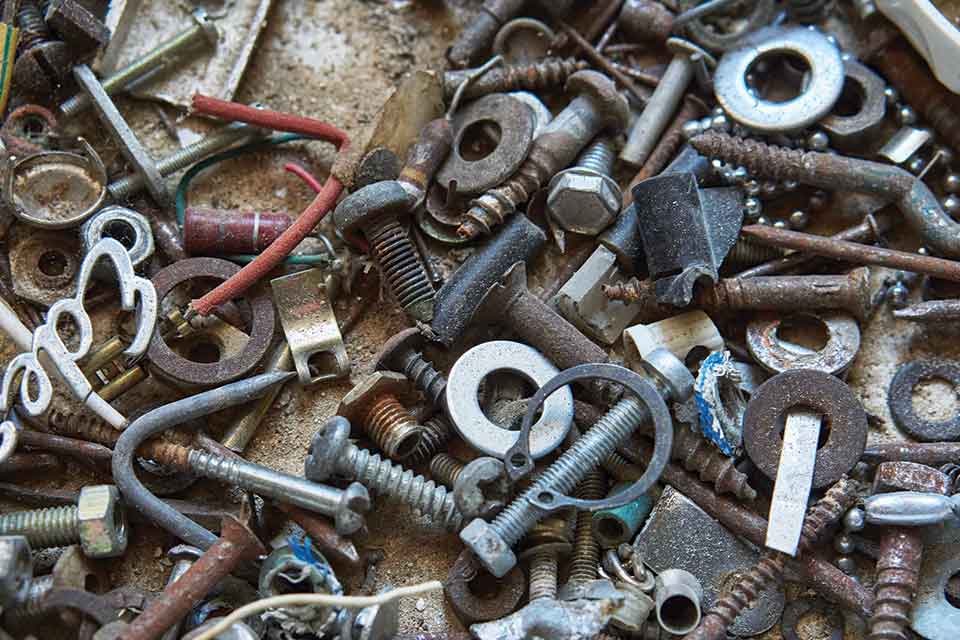The Man Who Unscrews Everything

Written in the early stages of the pandemic, this fairytale-like story finds a man looking to shape his environment to reflect the fragility of life—one screw at a time.
An insignificant man sleeps upon a steel bench at the quiet end of a suburban shopping strip. He has nothing to his name, save for a set of screwdrivers inside the pocket of his heavy coat.
Shortly, he shall render this sturdy bench, and its surrounds, wonky.
Moreover, his surgical removal of nigh on every screw in the strip shall be perfectly clandestine.
But presently he dreams of clomping across an alpine river as a boy.
The rocks of the riverbed clatter like bumping marbles below him and the water rises further up his waders with every step.
Waist-deep in the river’s central channel where the sunlight passes right through the water, he first casts his line and then settles in, to admire his immaculate bamboo rod with its imitation gray mayfly—all his own handiwork. He admires his heavy utilitarian vest with pockets packed full of lures, hooks, and nymphs. He admires his own preparedness as he sips on the plastic straw of a juice box secured in his breast pocket.
And he admires the resoluteness of his stance in the river—his command over the flow of the natural world and his resistance to its pull, as it rushes toward him, around him, and through him.
But there are no trout today.
At the plopping of every stone into the water from the riverbank and with the breaking of the surface by every leaf and twig, the boy flinches into action and then slouches with disappointment.
The flow of the river also hastens from the overnight deluge and the boy leans into its force—one foot in front of the other, the water rising up to his belly button.
Two swimmers disrobe on the riverbank, unaware of the changing conditions.
And then the boy hears it—a hissing surge like a hundred thousand showerheads blasting all at once, approaching like a runaway train, coming around the bend.
“Don’t swim! Leave!” he implores the swimmers, but they shrug, dismissing him—some dramatic boy.
A furious slick of uprooted trees and rocks and churning water thunders downstream as the boy’s rod and hat are sucked under and away.
With the water level now at his nipples, he wades with his arms too, before his vest and overshirt are torn from his chest.
In just his waders now, he clings to an overhanging branch with both hands, his feet kicking behind him and his whole body outstretched as a wall of destruction rises in front of him.
The relentless pull of the flood busts the straps of his waders, tearing them from his body. He is naked and horizontal, skipping on the surface of the water, still gripping the branch, until he can no longer resist, letting go.
The nightmarish banging of the riverbed’s stones merge with the reality of an ascending roller door’s aluminum shutters, as the prostrate old man groans and turns on his bench.
The bakery café’s manager jams her cigarette in the cylindrical butt bin on the wall before returning with another stack of outdoor chairs.
The man surveys this familiar scene through narrowed eyes. The same early-morning shoppers entering and exiting the same shops to buy the same products.
But any thought of returning to sleep is instantly extinguished: the smoldering butt bin has a loose screw, two-thirds removed from its wall fixture.
With a great stretch, a yawn, and the impetus of productivity enlivening his limbs, his stooping frame shuffles toward the assignment with a hand inside his interior pocket. His fingers tiptoe along the heads of old screwdrivers.
His fingers tiptoe along the heads of old screwdrivers.
It is not uncommon for the man to set himself to tasks like this without invitation or fuss, what with the bakery café’s outdoor seating area; the fruit store’s stand of cobbled-together pallets; the independent grocer’s signage and doors, plus the dozen other small businesses around. There is very often a wobbly screw in the strip.
He wields the screwdriver like a hydraulic extension of his own arm, and no sooner has the screwing begun than the screw is again flush with the wall.
As he laboriously rears back up, though, a sense of displeasure nags at him.
Unable to place the source of this feeling, the man bends down once more—examining his work to locate the origin of his discontent. Getting so close to the bin as to nearly touch it with his nose.
“The screw is back in its home,” he mumbles, “and my work is immaculate. Why then, this discontent?”
Curious to untangle his own impulses, the only recourse is to remove the screw.
As he does so, a familiar sense of satisfaction is aroused in the man.
Intrigued by the abstractness of his own thinking and determined to test it out, he spends the rest of the morning covertly removing every screw he has reinserted over the years—maybe forty across the strip.
Shoppers and shopkeepers alike were always at pains to avoid his gaze and negate his roaming presence, but, some years earlier, the man had a home and a bed to which he retired of an evening.
He had rented a nearby Victorian townhouse for a decade. At the rear of the dilapidated house was a warped weatherboard shed, and in it sprawled a model railway diorama—a bustling modern world in miniature, created and toiled over by the man alone.
Raised to waist height in front of a watercolor backdrop of the city’s skyline and its surrounding hills, to-scale models of notable landmarks were laid out: the ornate town hall with its cracked concrete pillars and an interior resplendent with the man’s favorite art; a towering high rise—with windows that could be peered through to see people living quietly in fully furnished apartments; and the shopping strip—frequented by all manner of busy shoppers in composed harmony.
The work was glued with eyedroppers, secured with tiny screwdrivers, and painted with delicate brushes under a headband magnifier. Then it was wired with tweezer-sized pliers and artistically weathered.
Between the collections of buildings also lay a vast network of grass-covered lawns and verdant forests, replete with flowering garden beds and fine-blended leaves at the base of each rubber tree trunk. A river with a shimmering, rippling depth curved its way throughout the entire scene.
But the showpieces were the trains themselves. They moved with such steady efficiency across a network of rusted bridges and sweeping bends and furtive tunnels that the man, not normally given to pride, would regard the trains as if each represented a particular virtue of his own character: the whistling old steam-engine locomotive denoted stoicism; the long, chugging freight train demonstrated patience; and the unglamorous everyday passenger train—with its timetabled arrivals and platform announcements, its screechy brakes and the beeping of its doors—embodied dependability.

The man, not normally given to pride, would regard the trains as if each represented a particular virtue of his own character.
Despite starting the project with no talent for building and little in the way of dexterity, he had designed, engineered, and maintained everything himself.
From sunup to sundown on weekends and every spare hour after work, he would retreat to his drafty shed, inching through the door and dropping to a crawl toward his swivel seat at the porthole-sized control station, from which he patrolled the goings-on in 360 degrees.
The man spent so many months of each year crawling beneath the diorama, straining his neck around to snip, solder, or feed wires to the set that he developed a slight hunch and arthritic fingers. It was sweaty, fiddly, and oftentimes claustrophobic work, but it had cultivated within him a well of extraordinary patience that he acknowledged as a virtue far greater than these maladies.
He would often sit at his post, arms folded across his chest and eyes closed, conscious only of the soundscape of the trains’ comings and goings.
If ever one of his sales co-workers would ask why he spent his weekends this way, the man expressed an earnest desire to “just use his hands.”
“We’d all love to take a good look at whatever your favorite locomotive is, during after-work drinks this Friday,” his boss had said once, showing uncharacteristic interest in the man.
But when the time came, it became clear that this was just a rouse to lure the man into coming and being the unwilling butt of every drunken gag—his train shoved back and forth across the bar to transport cash to the staff. His boss making a show of him with work-related questions he well knew the man could not answer. The man was not university-educated in business, or indeed anything, as they all were. He had hidden in the bathroom until they had lost interest in the train so he could retrieve it and slip out.
And so this chapter of the man’s life saw him seeking the steady hand of constant distraction, which slowly came into being through his immaculate little world.
One afternoon, he acknowledged that this world was perfect and finally—finished.
“Though it has perhaps come at the expense of my sharing in friendships, or having money to spend on other comforts, or travel, this is precisely the article of my imagining, almost a decade ago.”
In that moment, the man understood that a singular thought, followed by the many actions that followed, had intertwined with such fluidity that the imagined had become real.
He was overcome with sentimentality and, to memorialize these feelings, dedicated every train and building to people for whom he’d felt a fondness during his life—engraving and affixing tiny plaques in their honor.
But he was being made redundant at his work, his boss told him. It was no great surprise to anyone, least of all to the man—who had felt confused and ostracized by his fast-talking colleagues.
With no savings nor assets to his name, there was no remedy but to request an extension from his landlord of many years.
“You have that modern railway diorama in my warped weatherboard shed,” the landlord pointed out, and deigned to permit two months rent-free, in exchange for the entire contents of the shed.
“After all,” the landlord observed, “it was built without prior written permission.”
The man protested and pleaded with his landlord and tried desperately to find work. Once that appeared fruitless, he tried to find suitors for the whole railway such that it would be preserved.
But two months expired and the landlord ushered in hordes of spare-parts enthusiasts one afternoon. Each forager lumbered in with their own tool set and immediately set to work extracting the pieces they wanted, with no regard for the whole. With the extraction of every rail, every sign, every screw, the soul of the diorama was dealt a little jab, until it was a pummeled heap of leftover bits.
The man silently observed the scavenging and slipped whatever remained of his own tools into his coat pockets, and he left. His perfect world of uncomplication had disappeared in an instant. How permanent it had seemed; how fragile and pointless it really was.
His perfect world of uncomplication had disappeared in an instant.
The man’s dreams of his trains rattling along their tracks merge with the clanking shutters of the bakery café’s roller door, as he lies on his side on the bench. This time, though, the door descends, and the manager disappears down the street, a cigarette pursed between her lips. The trading day is over, but for the man, a long night awaits.
As he groans onto his side, a metallic swooshing of screws falls from one side of his coat pocket’s polyester lining to the other and comes to form a trellis about his ribs, cushioned by a mattress of folded-up toilet paper squares. He pads about his chest with swollen fingers, reminding himself of the morning’s triumphs.
Removing a screw here and there from all these dreadfully secure things had done nothing to alter their sturdiness, and, despite his hunch and his tattered coat and the increasing rattling coming from his person whenever he moved, nobody paid him any attention.
When one knew where to look for them, screws appeared everywhere: the corrugated iron awning that ran the full length of the strip; the lightboxes suspended from that awning; the street signs and poles; the street numbers; the wall exhaust fans; the pay phone; the signage boards and sensor light of the independent grocer; the outdoor sets of tables, chairs, umbrellas, and laminated wall menus of the bakery café; the door hinges and roller door handles; the drinking fountain; the meter boxes; the planter boxes and the bus stop. How safe this façade appears, he had pondered, unable to reconcile this mistruth with his own journey through the world.
It was clear that the morning’s exercise was no more than a framework upon which a far grander concept might be realized: tonight, he was to remove hundreds and hundreds of screws.
Tonight, he was to remove precisely the number of screws required for the strip to maintain its functionality and its safety, but no more.
“Nobody who comes here deserves to be deceived, as I have.”
A darkness familiar to the old man falls upon the strip. The glow of a solitary streetlamp merges with the lurid white lightboxes and the orange pay phone. The grocer’s sensor light promises to join in too—oftentimes the man’s only friend, but tonight a foible.
With the choreography mapped in his mind, he sets to work at the midpoint of the strip.
Standing resolutely beneath the grocer’s awning atop two discarded wooden fruit boxes, the man loosens the fixture of the light’s sensor and points it directly at the sky. His activities on the footpath will now be obscured from the looming council flats’ tower.
While outside the grocer’s, he deploys the largest of his screwdrivers to remove all bar one of the screws fastening the corrugated iron awning to its wooden slats—a process he will repeat at each posting.
The grocer’s rectangular matte lightbox is loosened on every side—like an exploding diagram of each of its parts with unfiltered light spilling out its sides, while the top screw of both street numbers are removed so the numbers fall upside down.
The headlights of a car round the corner, and the man freezes atop his fruit boxes. The car stops, ignition off, and a young family gets out of the car. They shuffle off toward the council flats. The man calms himself to steady his hand once more.
He moves on to the fruit shop and refashions the already haphazard fruit stand into a formless shipwreck.
In such a frenzy of focus is the man that screws are thundering down onto the marble-specked concrete tiles with the varied tones and tinkles of a child’s piggy bank, shaken upside down over some linoleum flooring.
The precinct’s accessories are adjusted too—the street signs suddenly dangle diagonally; the council’s irrigated planter boxes now bleed sodden dirt onto the footpath through every corner of their timber frames, and the pay phone, its steel base slackened, heels in the wind like a yacht with an orange lantern.
Next he modifies the bakery café, whereupon the umbrellas crumple up like broken birds and the laminated wall menus appear half-melted.
Finally, the cigarette bin is reduced to a single affixing screw. It sways with such seasick fluidity that the faintest touch of the manager’s butt will capsize its entire contents onto the pavement.
“I am finished,” the man acknowledges.
A magpie circles overhead, causing the grocer’s skyward-facing sensor light to flash on and off repetitively, but it is of no worry now.
The first of the morning sun peers over the horizon to absorb the mess of light now strewn about the strip. A crisp wind courses through, and every constitution of the strip’s fragile edifice rattles monstrously.
The man hobbles over to his wonky bench, his feet wading through a sea of screws, his swollen fingers and bent back throbbing.
His crumpled frame sprawls onto the bench as if it were a life raft.
As the man sleeps the deepest sleep of his long life, the first commuter train of the morning nears the strip, its workers unaware of all that has transpired here this evening.
The sleepers of its tracks rumble against the ground, the familiar vibrations soothing the man and becoming tangled in his dreams.
As the train approaches, every screw obscured to the man the night before—in the structural beams and the stocked shelves and cash registers—begins to twist.
Eltham, Victoria, Australia











